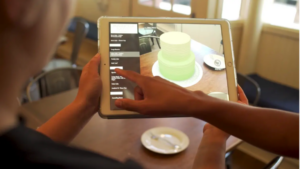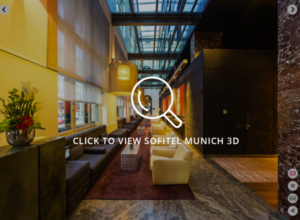In the constantly evolving landscape of the hospitality industry, staying au courant with the latest technology trends isn’t just a strategy—it’s imperative for survival. New technological advancements continue to redefine industry norms and expectations, but none have caused quite like the ripple effect of Augmented Reality (AR) and Virtual Reality (VR). As we stand at the precipice of this digital revolution, let’s dive deeper into how AR and VR have seamlessly integrated themselves into the hospitality sector, providing innovative solutions for enhanced guest experiences and operations.
VR: A New Lens To Explore
The concept of Virtual Reality (VR) is anything but new; however, its incorporation in the hospitality industry is leading to trailblazing customer experiences. One of the primary ways VR is being utilized in the industry is through the creation of virtual tours.
Marriott Hotels, with its innovative ‘VRoom Service‘, exemplifies this trend. In an era where consumers base their decisions strongly on online research and reviews, Marriott has capitalized on VR technology to present potential guests with immersive, 360-degree tours of various locations and rooms, right from the comfort of their existing location. This approach inspires confidence and trust in the customer as they make an informed decision on where to best enjoy their stay.

AR-Redefining Culinary Experiences
Where VR has made its mark, Augmented Reality isn’t far behind. AR has infiltrated the world of culinary hospitality, reimagining the basic concept of presenting menu items to create interactive experiences. A great example is a NYC-based AR startup, Kabaq, which uses a photo-based system that captures food items within minutes and processes them on its cloud server to create ultra-realistic 3D content, optimized for AR. The company then manages and distributes this content to all AR-supported platforms for their clients, among them burger chain Bareburger and Magnolia Bakery. This innovative method of showing customers what they can expect to order promotes a deeper level of engagement and enhances their overall dining experience.

In-Room Services, Reimagined
Both AR and VR have been successfully harnessed to transform traditional hospitality services. Shangri-La Hotels and Resorts, a global luxury hotel chain, leverages VR technology to offer guests unique in-room entertainment. Guests can strap on a VR headset and embark on diverse adventures without stepping out of the comfort of their room.
AR, on the other hand, is amplifying the utility of everyday in-room services. MGM Resorts in Las Vegas has incorporated AR to provide unique in-room dining experiences where guests interact with digital and physical culinary aspects. Also, tech-savvy chains like the Hyatt Hotels are exploring ways for guests to unlock room doors or customize room lighting, temperature, and entertainment using AR via their smartphones.

Safe and Effective Staff Training
Beyond augmenting customer experiences, VR’s potential includes boosting internal operations. Hilton Hotels has found a practical use for VR technology in staff training programs. Employees can ‘step into’ a simulated reality, replete with scenarios modeled on real-world situations. This risk-free environment allows trainees to make mistakes and learn from them without real-world repercussions, giving them the confidence to perform their duties effectively when they step into their actual roles.

Beyond Traditional Tourism
AR and VR technologies are now promising to take customers on a journey beyond traditional tourism boundaries. For instance, Accor Hotels has released an app that enables customers to tour selected cities and landmarks virtually. Moreover, destination-orientated VR experiences, such as exploring the world’s stunning reefs through a VR scuba diving experience, are being introduced as part of their offered experiences.

In essence, AR and VR are not just a futuristic possibility but a present-day reality transforming the hospitality sector. Not only are these technologies enhancing guest transactions and experiences, but they are also helping operators streamline their business operations and training methods and strategies. Furthermore, they are also creating endless opportunities to engage customers and provide unforgettable and personalized experiences.
As AR and VR technology continues to evolve, the possibilities for implementation in the hospitality sector will only grow, becoming an integral part of the industry’s future. The hospitality industry, with its focus on providing memorable personal experiences, stands to benefit enormously from these immersive technologies. With AR and VR pioneering an undeniable shift in the hospitality industry, the establishments that champion these technological solutions are likely to secure a substantial competitive advantage, heralding the future of hospitality.
